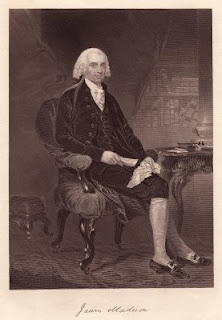
- Presidency from 1809-1817
- Served two terms 1809-1813, and 1813-1817
- 4th President of the United States
- Born in Port Conway, Virginia (March 16, 1751)
-Father: James Madison
Mother: Nelly Conway
- He was the oldest of 12 children
- Considered one of the Founding Fathers of the
United States
- Nickname: Father of the Constitution
- Wrote the federalists essay with the help of Alexander Hamilton and John Jay
- Responsible for the ten amendments of the Constitution (Bill of Rights)
- Married Dolly Payne Todd Madison (no children)
- Attended the College of New Jersey (now Princeton University)
- Early Career: Lawyer, United States Secretary of State under Thomas Jefferson
- During Secretary of State, played major role in buying Louisiana Purchase
- Helped with the Embargo Act of 1807 to stop seizure of American ships by Britain
and France
- He participated in the Virginia and Kentucy Resolutions (nullify if unconstitutional)




